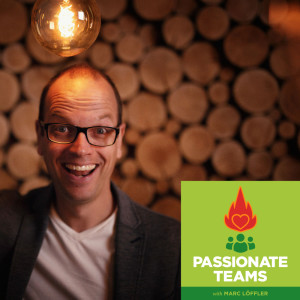
261.5K
Downloads
342
Episodes
Agile Unfiltered – mit Marc Löffler ist der Podcast für alle, die echte Transformation erleben und verstehen wollen.
Ohne Filter. Ohne Buzzwords. Ohne Theater.
Marc Löffler gehört zu den bekanntesten Agile Coaches im deutschsprachigen Raum und bringt über 20 Jahre Erfahrung aus Transformationsprojekten, Leadership-Workshops und Teamcoaching mit.
In jeder Folge bekommst du:
-
ungeschönte Einblicke in reale Transformationen
-
Werkzeuge, die wirklich wirken
-
systemische Perspektiven auf Teams & Organisation
-
Klartext über Leadership, Change und Zusammenarbeit
-
praktische Tipps für Scrum Master, Agile Coaches & Führungskräfte
Die Folgen sind ehrlich, direkt und sofort nutzbar.
Neue Folge jeden Dienstag.
Episodes

Monday Mar 26, 2018
Scrum and Passion, an interview with Dave West
Monday Mar 26, 2018
Monday Mar 26, 2018
In this episode we talk with Dave West, CEO and Product Owner of Scrum.org. Here are the key take-aways:
Passion by delivering things that are valued by customers
Scrum is a response to the underlying need for empiricism and self-organization for software teams. Now that results in amazing products for customers, because you're continuously testing your hypothesis by delivering working software to customers, and it also ultimately results in teams that are much happier, much more content, much more, you know, having fun, because ultimately what's the most enjoyable thing that any team can do? Deliver, and deliver software that people want, or deliver product that people want, or deliver value that people want, and I think that is ultimately what Scrum is all about.
Passionate teams care about the people they work with
You actually care about the people you work with. You care about the people that you spend every day, you know, delivering value to, and I think there's a third dimension, which is about the mission. I think that certainly for me the most passionate teams that I've been on, and the most enjoyable teams I've been on, are ones where my personal mission is aligned with their mission and with the organization's mission. When you've got that synergy, I think it's very easy to care very deeply about what you're doing and the people you're working with and the outcomes you're achieving.
Humor creates a passionate environment
Of course, everybody has to be a little, you know, can't take themselves too seriously, and laughs at the world around them a little bit, because that ultimately creates an environment of passion, of success, of et cetera, but they didn't add it, but I do wish that we had humor. I think sometimes we get very- take ourselves a little too seriously, and I think if you can smile at the situation you're in, and as a team if you can share that, you know. […] I think, because of their ability to work as a team and to have passion and to support each other and to deliver, ultimately, the results that they needed.
Scrum is in response to the social system we live in
I think some of the reasons why people are unhappy is because ultimately the social systems, and I consider organizations and the teams and the structures and the departments, et cetera, to be ultimately a social system, the social systems that we constructed as part of Industrial Revolution and sort of the change in the 1900s with Taylorism and Ford and the like, the social systems that we created ultimately are not designed for the world that we now live in. [. …] Ultimately these social systems are built around reducing risk and ensuring predictability and ensuring that everything just goes in this very efficient way, efficiency, predictability, and risk are sort of like the tenets of modern organization. […] Well, we live in a world of opportunity, a world of really innovation where it isn't about whether you can do something. It's how you can do it, is it economic to do it, is it the right thing to do, the rise of agile and particularly, you know, Scrum being the most popular agile approach, is definitely in response to this world that we live in.
The most happy and successful teams are agile
The most successful, most happy teams I've seen are agile. Now whether they're doing Scrum or not, you know, but they're working empirically, they have control of their destiny, they have an alignment to some sort of vision and passion and direction.
Passionate teams work and help in community
So I love organizations where you are rewarded for being really good at what you do. That also means to be good at what you do requires you to help others do what you do. […] If I end up with these heavy dependencies on people, well, one, that's a huge risk. But also it's not very scalable. So instead, let them teach others, whether it's pairing or mobbing or whatever, to all get better, and then over time then everybody's helping each other but you reward them for it. You incentivize them for it. You pay them for it. […] But it's more in a community or guild or a whatever weird word you want to use, but I love community, and I think we need to incentivize people for working in community and helping community. And that's actually not just true inside organizations. I think in general we should reward people for their contributions to community rather than their ability to have hundreds of people report to them.
Safety and trust are the key for passionate teams
Safety and trust are key words for building these kind of teams, and safety and trust require focus and energy. You have to give people freedom, learn together, and understand where the boundaries are. There's certain things ... You're building pacemakers. You do have to have other people check your work before you deploy it, you know? I mean, you don't want a pacemaker to go wrong. Nobody wants that.

No comments yet. Be the first to say something!